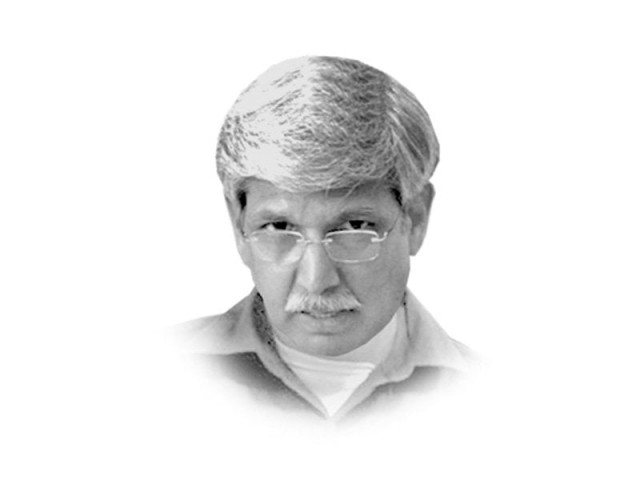Modi’s four different avatars
To tie Pakistan around in knots on terrorism alone was thus not an impromptu, nagging complaint.

The writer is a defence analyst who retired as an air vice-marshal in the Pakistan Air Force
Consider: Pakistan’s terror concerns are as strong. In Balochistan and in Fata, India and the Afghan intelligence apparatus, in consort, continue to unleash their insurrection through a reign of terror. Two of the deadliest TTP groups now reside in the borderlands of Afghanistan and eat off the hands of both the Indian and Afghan intelligence. Such sponsored terror is now an existential danger to Pakistan’s security. Nawaz chose not to mention this to Modi. Why? This remains an enigma. Terror is a two-way concern. And let me add, as long as Kashmir doesn’t resolve — not as per the conventional option of ‘with one or the other side’ alone — terror will continue to be the only tool that the repressed there will use to assert their voice against the state’s repressiveness. Terror in Kashmir is rooted in Kashmir and is only augmented by regional imports, just as Pakistan faces a conglomerate of threats coalesced under the banner of ideological support to a brand that works against Pakistan.
Did the two heavily-mandated leaders of the 1.5 billion humanity in the two countries ever spare a thought on this count? On how they could garner their effort and direct their underlings to crack the issue of terror, Balochistan, Kashmir and all else related to it such as Siachen and water, and trade and travel, and cooperation and coordination against food and energy insecurity and against poverty and disease, and of course, water conservation — as the two hurtle headlong into what will soon be water-scarce conditions. Sadly, none. Shackled in bureaucratic parlance and eating out of the hands of stagnated ‘babus’ on both sides, their performance was vintage primeval and tribal. Sharif did better in not saying anything. I can imagine why; he did not wish to upset the applecart that he so dearly has wished to drive even what he carries on it is rotten to the core. It was patent bankruptcy. Political will non-existent; minus a vision or a sense of history, or even how the moment that providence has brought before the two was lost to the vagaries of small mindedness. By early signs and by the way of how the first opportunity went, Modi is no statesman, though he has time on his side to prove us all wrong.

When the leadership goes missing, minions rule. While Sharif mentioned in his brief statement that foreign secretaries were to meet soon, India’s foreign secretary stated, “they were to only keep in touch, and that necessarily did not have to be through a meeting; respective foreign offices could be the avenue of contact”. Talk about underplaying the moment; or was it trivialising? Yet again, when asked, if Sharif had invited Modi and if Modi has accepted: “yes; like all other Saarc leaders. But, it doesn’t mean that he will go next month or the next or even next year”. We, however, offered our commitment and complete sincerity to resolve issues with India and seek to improve the lot of the 1.5 billion people. That is good, but how? The foreign secretaries will work that out, ‘by not meeting, but through simply keeping in touch?’
Bureaucrats are masters at inaction; left to them not much should move; only ‘convention’ and ‘processes’ rule. That convention, sadly, is the baggage of hostility only between the two nations. The only other thing that can guide is Modi’s campaign rhetoric on punishing Pakistan; and he may have a 56-inch chest, but he surely doesn’t have a matching heart to escape the inevitability of such recourse. Military chiefs, thus, will be well advised to prepare for upheavals that will know only the recourse to arms if Indian sensibilities are offended. One other concern: if the Modi model seems to falter at any point, expect him to fall back on other tools in the kitty; a la Pakistan, Article 370, Ayodhya, each with its own fallout.
One should, perhaps, cut Modi some rope; after all it was only his first day in office. And he could only say what he was told to say; his own proclivity of both thoughts and words equally unsavoury for a civil occasion. But then, when you tell Bhutan and Nepal on what India will be working on with them next, and tell Sri Lanka to deliver on the thirteenth amendment for greater Tamil inclusivity, and tell Bangladesh off on the Teesta River Agreement, it smacks of pointed homework. To tie Pakistan around in knots on terrorism alone was thus not an impromptu, nagging complaint. Modi’s five points laid out clearly the road map for what Pakistan needed to do before any normalcy is expected. A Kingly act, undoubtedly. Except that it has kept us bound in a stagnated logjam for the last six years. In the meanwhile, the poor and the dispossessed await a turn of events that may just grant them a turn in their lives. The moment for such an opportunity was lost at the hands of an unimaginative and a feeble leadership; nay, an absence of statesmanship.
There will be four different avatars to Modi: one for India, of the Article 370 and Uniform civil Code kind; another for the Indian corporate world; a third for the world at large — business, investment, etc; and one for Pakistan. It remains best to keep an eye on how Pakistan’s Modi unfurls.
Published in The Express Tribune, June 8th, 2014.
Like Opinion & Editorial on Facebook, follow @ETOpEd on Twitter to receive all updates on all our daily pieces.














COMMENTS
Comments are moderated and generally will be posted if they are on-topic and not abusive.
For more information, please see our Comments FAQ